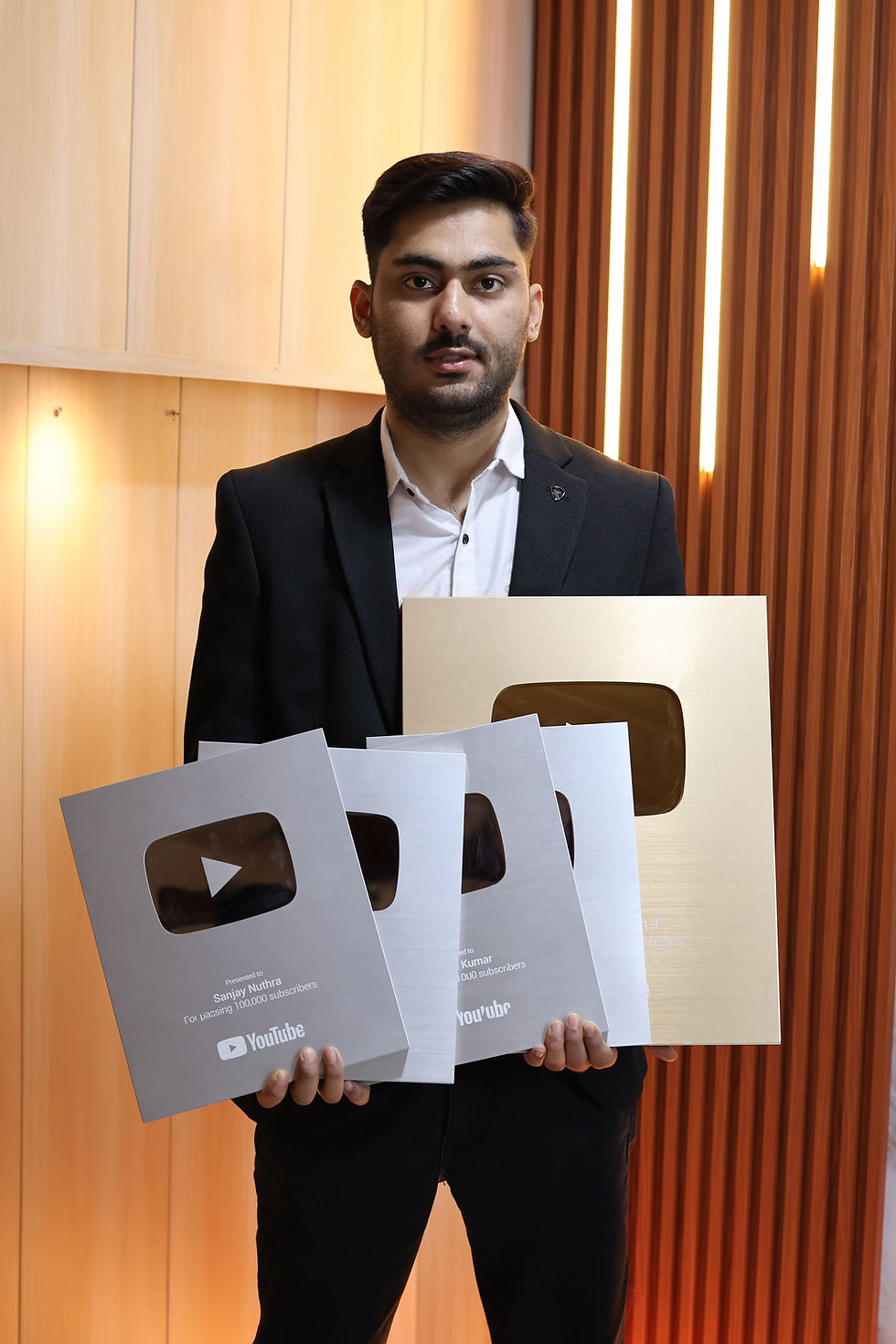Ishika Pathak - Edition 29 - The Entrepreneurs of India
- Aug 8, 2025
- 4 min read
Ishika Pathak was born and raised in a business-oriented family. From an early age, she observed her father managing finances firsthand. During her time as a commerce student in Class 11, her understanding of accounts and money management evolved as she watched him work closely with his team. This early exposure inspired her to begin assisting with daily cash flow operations, deepening her interest in finance. Her passion developed naturally. Alongside her academics, she played an active role in her father’s financial management. This hands-on experience offered her insights that extended far beyond textbooks. These formative years clarified her ambitions and motivated her to pursue a meaningful and impactful career in finance.“Finance always felt less like a subject and more like a language I was meant to speak,” she reflects.
In her current role as an investment banker, every day presents something new. Her mornings begin early with coffee and market updates, followed by a day filled with client meetings, calls, financial modeling, and presentations. Some days involve explaining deal structures to clients; others focus on team strategy. The role demands adaptability and problem-solving, but she finds it incredibly rewarding to work on deals that truly influence businesses. It’s a balance of collaboration, communication, and constant learning. A defining moment in her journey was closing her first major deal. After months of hard work and overcoming multiple challenges, witnessing the client’s satisfaction made the effort worthwhile. It was the first time she felt a true sense of validation, a moment that affirmed her choice of career and gave her confidence in her ability to take on big responsibilities and make an impact. “The real win wasn’t just the closed deal—it was knowing I could carry something from start to finish and deliver value,” she says.
Like many young professionals entering competitive fields, she faced challenges. Adapting to the pace and expectations of the industry was initially tough. Everything was new, and the learning curve was steep. However, over time, she developed better time management and learned the importance of seeking guidance and support. These early experiences helped her build resilience and sharpen her ability to handle demanding situations. She acknowledges making mistakes—especially when trying to manage everything alone in the beginning. Wanting to prove herself, she occasionally took on more than necessary, resulting in stress and small errors. One of the most important lessons she learned was the value of asking questions and clarifying doubts early. If given the chance to start over, she would be more open to learning from others and seeking help without hesitation.
Working in a high-pressure field like investment banking required her to quickly learn how to manage stress. She breaks big tasks into manageable parts, focuses on what she can control, and takes brief pauses to reset during intense periods. Talking to her team when things get challenging has also been helpful. Most importantly, she views pressure as an essential part of growth, something to embrace rather than fear. “Pressure doesn’t break you—it shapes you,” she says. “It’s in the stretch moments that you grow the most.”
She believes a common myth about investment banking is that it’s purely about numbers and devoid of personal life. While the job is demanding, it involves far more than spreadsheets. Building client relationships, understanding business operations, and strategic thinking are at the heart of it. With smart prioritization, balance is possible. The work is collaborative, engaging, and constantly evolving.
She sees the finance industry changing significantly for young professionals, especially women. There is a stronger push for diversity and inclusion, with firms actively working to promote women into leadership roles. In India, women now form around 24% of the BFSI workforce, though mid-senior representation is still low. Globally, similar initiatives are underway. The rise of fintech and remote work tools is also making the field more accessible. At the same time, younger professionals are prioritizing work-life balance, sustainability, and social impact, reshaping the culture from within. To students aspiring to enter the finance world directly after college, her advice is rooted in experience. Cultivate curiosity by learning how markets and deals work. Build strong habits like time management and attention to detail. Don’t shy away from asking questions—growth comes from being open. Networking is also key. Connecting with seniors, attending webinars, or reaching out professionally online can open unexpected doors. And above all, understand that it’s okay not to know everything at the start. Patience and consistency will go a long way.
Several key traits have helped her thrive in investment banking. Attention to detail is critical—small mistakes in financial models can have major consequences. Time management is essential, given the pace and pressure. Strong communication is necessary to simplify complex topics for clients and teams. Teamwork is fundamental—no deal is done alone. Remaining calm during challenges and staying curious about evolving industry trends has also been vital to her continued growth.
Her family has been a strong pillar of support. While they never dictated her path, they always encouraged her to aim high. Their belief in her gave her the courage to pursue a career as demanding as investment banking. Emotional and practical support—from understanding conversations to simply being present—has helped her stay grounded during stressful times. Having a reliable support system, she believes, is key to navigating high-pressure careers without losing oneself.
Mentors have also played an essential role in shaping her journey. She feels fortunate to have had seniors who guided her through high-pressure situations and offered real-world insights that went beyond academics.
Books like The Intelligent Investor by Benjamin Graham helped build her foundational thinking in finance. Podcasts like The Wall Street Journal’s What’s News kept her connected with global financial trends in an accessible way. She also gained valuable skills through online courses in Excel and financial modeling—tools she relies on every day. To those looking to walk a similar path, she recommends seeking mentorship, reading foundational finance literature, mastering practical skills, and staying curious about the world of business. These steps, though simple, lay the foundation for confidence and success in a dynamic and ever-changing industry.








Comments